
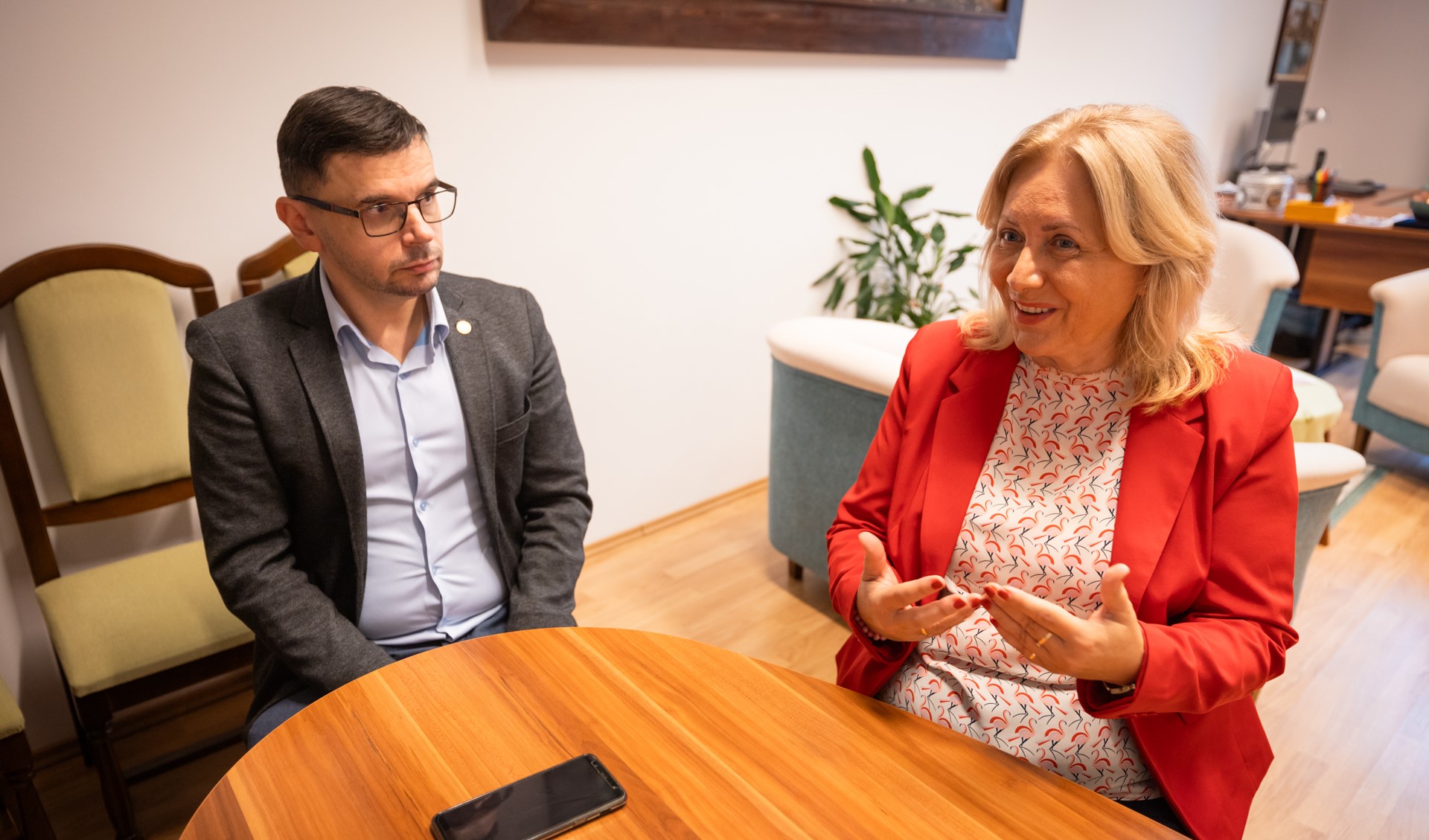
Groundbreaking mRNA research at the University of Szeged: New research center to drive future mRNA innovations
The University of Szeged already boasts three research programs aiming to harness the mRNA technology pioneered by Katalin Karikó. Prof. Dr. Antal Nógrádi’s research group is developing mRNA-based treatments for spinal cord injuries; Prof. Dr. Attila Gácser and his team are working on therapies for inflammation caused by fungal infections; and Prof. Dr. Ildikó Csóka’s research group is investigating the targeted delivery of active pharmaceutical ingredients via nano-carriers, with researcher Dr. Gábor Katona exploring whether siRNAs that inhibit mRNA decoding can be delivered to tumor cells. Additionally, Prof. Dr. Márta Széll, Vice Rector for Strategic Affairs at the University of Szeged, has revealed that the University is setting up a new research center to advance its cutting-edge mRNA research, with the Pasteur Institute now recognizing the University as its partner.
mRNA-based therapeutic research is currently one of the most prominent fields of interest in biomedical science worldwide. While this emerging field became widely known because of mRNA vaccines, Katalin Karikó’s research in the two decades prior to the COVID-19 pandemic was, in fact, driven by her desire to explore the potential of protein replacement therapies for cardiological and neurosurgical treatments. Drew Weissman, on the other hand, was drawn to the field through his research on HIV vaccines. Later, when Katalin Karikó joined Özlem Türeci and Uğur Şahin at BioNTech, their collaborative research efforts focused on mRNA-based personalized cancer immunotherapy and protein replacement therapies for treating rare genetic disorders. Notably, three of these four scientists will be delivering talks at the upcoming mRNA conference at the University of Szeged.
Medicine produced by the body
Prof. Dr. Attila Gácser, scientific organizer of the mRNA conference, describes mRNA technology as the Swiss Army knife of medicine. This is evidenced by the fact that leading scientific institutions around the world are currently conducting research programs focused on mRNA-based cancer treatments, therapies for metabolic diseases, regenerative medicine, and treatments for various infections. All these approaches are based on a common principle: instead of delivering proteins via administered drugs, mRNA that encodes those proteins is introduced into the body. This process is comparable to receiving a ‘prescription’ intravenously, enabling the body to produce the drug, i.e., the necessary proteins, itself. In some cases, mRNA is used to encode a protein that triggers an immune response, for example, to target cancer cells.
Katalin Karikó first began advocating for this new medical procedure amidst skepticism from fellow researchers. The turning point came in 2005, when she and Drew Weissman discovered that by replacing one component of mRNA with N1-methyl-pseudouridine, the molecule could enter cells without being detected by the body’s innate immune sensors, which typically search for viral RNA. The resulting patent has since paved the way for a whole new realm of biotechnology and therapeutic procedures.
Most recently, Katalin Karikó brought together many of her fellow scientists for the upcoming Novo Nordisk conference, set to take place at the University of Szeged in November. The list of presentation topics reflects the directions the Nobel laureate professor from the University of Szeged considers most innovative in basic research, mRNA technology applications, and therapeutic procedures.
Dr. Antal Nógrádi: A therapeutic protein reducing inflammation in spinal cord injuries
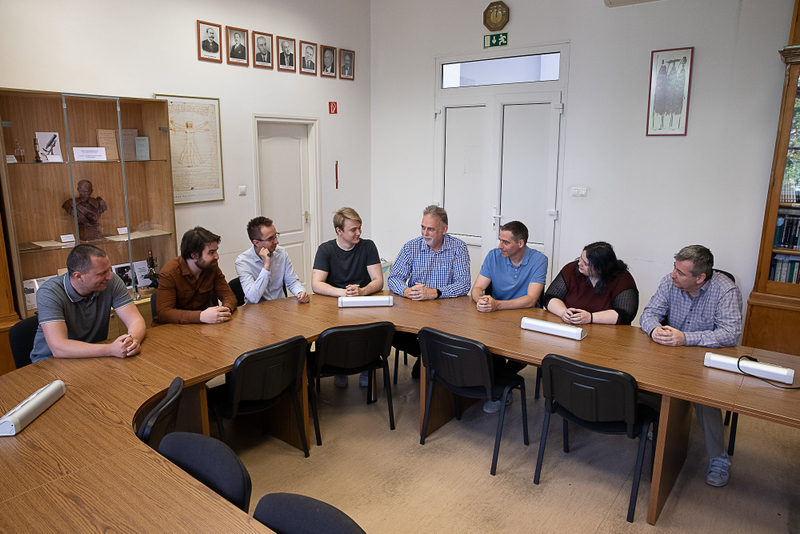
Antal Nógrádi (fourth from the right) with his research group. Photo: Anna Bobkó
Currently, there are several research programs at the University of Szeged that are connected to the topics addressed at the mRNA conference. In the Department of Anatomy, Histology, and Embryology at the Faculty of Medicine, Prof. Dr. Antal Nógrádi, head of the department, and his Neuroregeneration Laboratory have been investigating therapeutic options for spinal cord injuries for years. In 2023, Nógrádi’s research team published an article on a new procedure that utilizes mRNA technology to produce anti-inflammatory therapeutic proteins using mRNA delivered to the injured spinal cord. This research perfectly aligns with Katalin Karikó’s long-held vision that mRNA technology could play a major role in post-injury regenerative medicine. Professor Nógrádi will present his related findings on the first day of the conference.
“Spinal cord injuries often result in severe and permanent loss of function throughout the body; below the level of the injury, all motor, sensory, and autonomic functions are compromised. In the days following the trauma, a significant influx of inflammatory cells floods the damaged area of the spinal cord, triggering a secondary injury process that exacerbates the initial physical injury. However, this detrimental process can be mitigated or even prevented by delivering the mRNA of therapeutic proteins into the spinal cord. This promotes the survival of damaged neurons and supports neurite growth, thereby facilitating the reconstruction of spinal cord connections. Experimental treatment also fosters improvement in the restoration of motor functions,” says Dr. Antal Nógrádi.
Dr. Attila Gácser: A protein shutting down inflammation caused by fungal infection
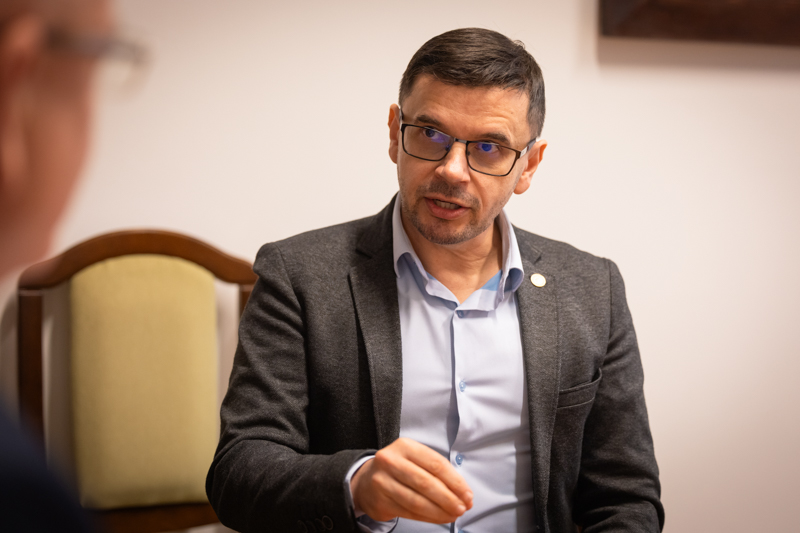
Prof. Dr. Attila Gácser, university professor and head of the Institute of Biology at the Faculty of Science and Informatics, University of Szeged. Photo: Ádám Kovács-Jerney
Leading a research group focused on fungal pathogens, Prof. Dr. Attila Gácser, head of the Institute of Biology at the Faculty of Science and Informatics at the University of Szeged, is engaged in a research program that utilizes mRNA technology. This research aims to develop mRNA-based therapies for infections caused by the Candida fungus, as well as two even more severe and often fatal fungal infections: mucormycosis and aspergillosis.
Attila Gácser has been studying pathogenic fungi at the University of Szeged for 20 years. Two years ago, he began exploring mRNA-based therapies, encouraged by Katalin Karikó and her former mentee and colleague, biochemist Norbert Pardi. His experiments with the Candida fungus are currently in the in vivo phase. Although preliminary results are promising, the biology professor emphasizes that there is still a long way to go:
“Candida infections can cause gynecological issues that negatively affect quality of life, and some studies suggest they may even contribute to the development of cervical cancer. However, the presence of Candida is usually not a cause for concern. This fungus is naturally present in everyone’s body, which means no one contracts a fungal infection from a toilet seat or their partner; rather, the infection develops internally from an imbalance in their own body’s flora. We believe the inflammation triggered by Candida contributes to the pathology, which is why we aim to eliminate it through mRNA therapy. Our goal is not to provoke an immune response against the fungus, as with preventive vaccines, since this could result in even more inflammation. Instead, our objective is the opposite: to eliminate the fungal factor responsible for the inflammation. We hypothesize that by deactivating this detrimental factor using the protein produced by the mRNA, the immune system will restore balance. This approach helps us avoid the common problem of antifungal treatments causing bacterial overgrowth and antibacterial treatments leading to fungal proliferation.”
New mRNA research center for new projects
In the near future, Attila Gácser’s research program at the Institute of Biology at the University of Szeged will be moved to a new research center equipped with state-of-the-art mRNA technology laboratories. The necessary infrastructure is expected to be fully operational by May 2025. This investment reflects the University’s commitment to leveraging Katalin Karikó’s support to inspire a new generation of researchers to pursue mRNA-based projects. Dr. Karikó even contributed to the construction of an animal research facility for the new center by donating her share of a grant associated with the Novo Nordisk Prize she received with her colleagues in 2022.
“In agreement with Katalin Karikó, we decided to establish infrastructure at the University of Szeged to support the realization of mRNA research ideas,” said Professor Attila Gácser. “New research programs are typically high-risk ventures, with potential pitfalls at every stage, from the initial idea to its actual implementation. Nevertheless, this investment will undoubtedly pay off, as the center will benefit not only my research group but also those at the University of Szeged who propose new mRNA research projects. The facility will house an in vivo and a five-laboratory in vitro research unit. Although it will be a small research center, it will operate with a clear focus and is expected to be competitive in international research.”
The researchers interviewed were unanimous in saying that Katalin Karikó regularly and intensively consults on the programs she supports. Her key advice for the University of Szeged is to focus on applications of mRNA technology in specialized areas that represent a ‘market niche’ amid the fields covered by large international pharmaceutical companies and research laboratories. While institutions with vast budgets can accelerate development across broad areas of research, the research groups at the University of Szeged may be more effective in addressing specific, well-defined problems.
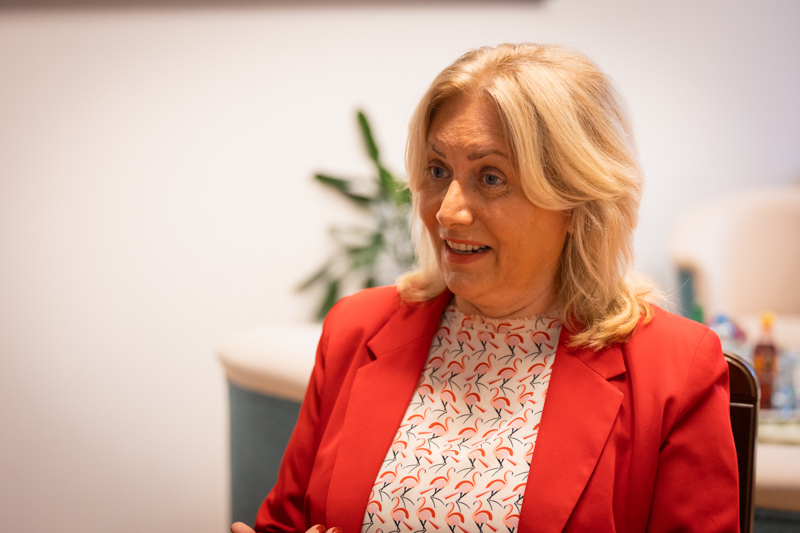
Prof. Dr. Márta Széll. Photo: Ádám Kovács-Jerney
This strategy has been validated by the significant interest the Pasteur Institute in Paris has taken in mRNA therapy research for fungal infections. In response to our question, Prof. Dr. Márta Széll, Strategic Vice-Rector of the University of Szeged, explained that the Pasteur Institute now sees Attila Gácser’s project as a complementary program to its own research efforts.
“Over the past two years, the relationship between the Pasteur Institute in Paris and the University of Szeged has grown stronger. Our most recent discussions have made it clear that the Pasteur Institute, with its legacy of over 100 years of infectious disease research, is closely following the University of Szeged’s mRNA research program on fungal infections. They view the new research center as a facility that will complement their own infrastructure. It is quite promising in terms of our university’s prospects that a world-class institute, home to 10 Nobel laureates, recognizes the potential for extensive collaboration in mRNA technology research,” emphasized the vice-rector.
Dr. Gábor Katona: Gene-silencing siRNA packaged in nanoparticles
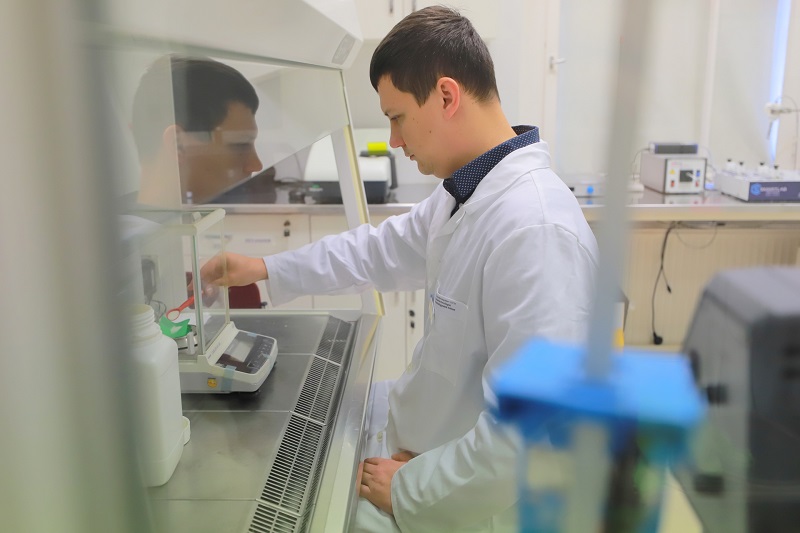
Dr. Gábor Katona, associate professor at the Institute of Pharmaceutical Technology and Regulatory Affairs, Faculty of Pharmacy, University of Szeged. Photo: Anna Bobkó
The University of Szeged is also home to a research project with a unique connection to mRNA. Dr. Gábor Katona, an associate professor at the Institute of Pharmaceutical Technology and Regulatory Affairs at the Faculty of Pharmacy, is developing a nano-drug delivery system designed to target malignant brain tumors via nasal administration. This method would allow for the delivery of gene-silencing siRNA, or small interfering RNA, into the tumor, effectively ’switching off’ the pivotal genes that drive tumor growth. This is achieved by the siRNA preventing the mRNA from being decoded into amino acids, thereby halting protein production and silencing the gene that encodes the mRNA. Dr. Gábor Katona’s research is currently in the preclinical phase.
“For nearly 10 years, our research group, led by Prof. Dr. Ildikó Csóka, has been intensively exploring the possibility of delivering various drug compounds into the central nervous system via the nasal cavity using nanoparticles. Our previous experience has been instrumental in successfully packaging siRNA into an appropriate nano-carrier system, which protects it from enzymatic degradation and enables it to cross the blood-brain barrier to reach its therapeutic target. The research on siRNA was made possible by the grant associated with the Jesse Stevenson Kovalenko Medal, awarded to Katalin Karikó in 2023, who generously donated it to the university. This donation aims to motivate young scientists involved in RNA research. I believe this goal has already been successfully achieved, as an increasing number of students are now engaging in this research, including members of the Students’ Scientific Association, thesis writers, and PhD students.”
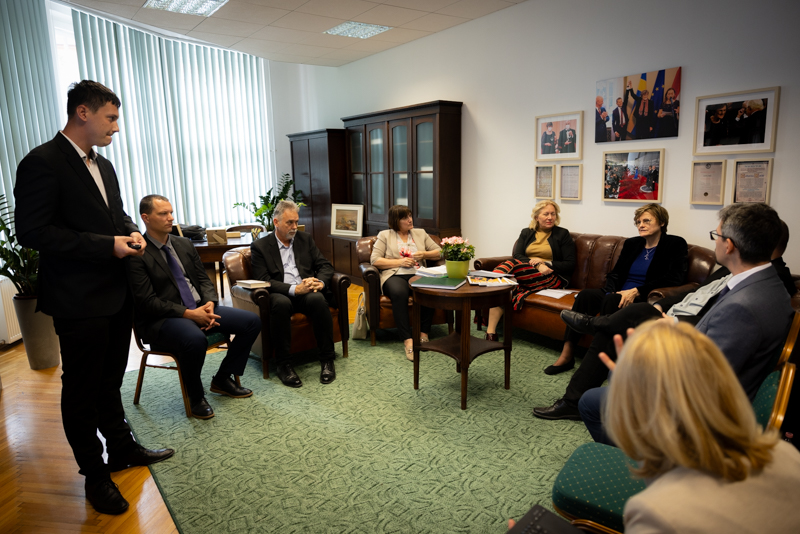
mRNA research at the University of Szeged being discussed in Katalin Karikó’s office at the University. Photo: István Sahin-Tóth
mRNA conference: first-hand insights into scientific discoveries
Prof. Dr. Márta Széll views the conference as highly significant for the University of Szeged.
“Thanks to Katalin Karikó’s efforts, our university will host leading scientists in mRNA research, whose findings are at the forefront of the field. In addition to drawing increased attention to the university, the conference will give many of our researchers and students the chance to participate. They will gain first-hand insights into the latest developments, which should be immensely inspiring for the university community.”
“I teach mRNA technology in my immunology class,” says Attila Gácser, who also serves as the scientific organizer of the Novo Nordisk mRNA conference in Szeged. “This will be an extraordinary and unique opportunity for my students to hear directly from the pioneers in the field and learn how all this knowledge came to be.”
The international m-RNA conference will take place at the University of Szeged on November 7 and 8. Katalin Karikó and Drew Weissman will be among the speakers, alongside Uğur Şahin, the CEO of BioNTech. Additionally, 13 leading mRNA researchers representing the cutting edge of international mRNA research will be coming to Szeged from the United Kingdom, the United States, France, Belgium, Sweden, Poland, Switzerland, and various Hungarian universities.
Original Hungarian text by Sándor Panek
Top photo: Prof. Dr. Attila Gácser and Prof. Dr. Márta Széll. Photo: Ádám Kovács-Jerney
University of Szeged to host two-day conference on the ‘Swiss Army knife’ of medical science
Top Researchers from Around the World will Present at the November 2024 mRNA Conference at the University of Szeged




